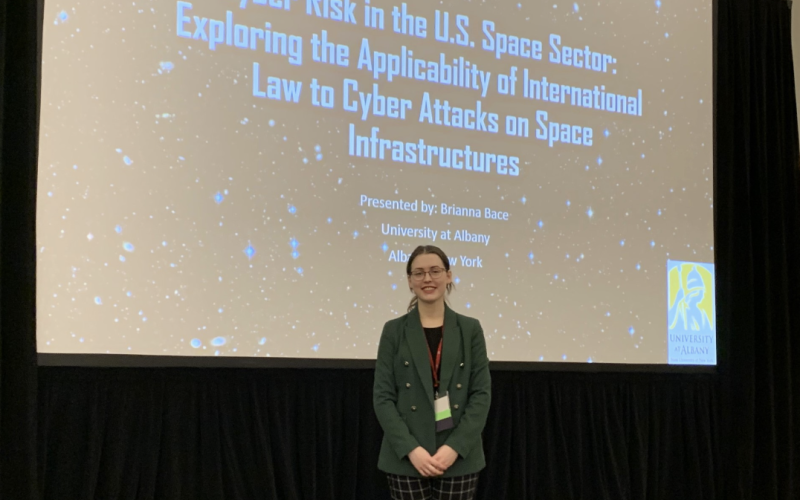CEHC Senior Brianna Bace Presents Cybersecurity Research Findings at International Conference

ALBANY, N.Y. (Feb. 5, 2024) – Brianna Bace, a recent graduate of the College of Emergency Preparedness, Homeland Security, and Cybersecurity (CEHC), has many accomplishments throughout her time at the University at Albany.
Bace, who earned her undergraduate degree last spring, double majored in political science and emergency preparedness, homeland security and cybersecurity, with a concentration in homeland security and is now pursuing a master's degree in public administration at Rockefeller College.
She’s always been passionate about working in politics and in the federal government. But, after competing in the Atlantic Council’s “Cyber 9/12 Strategy Challenge,” she has grown interested in cyber policy and law.
Last year, Bace was selected to participate in the Virtual Institute of Cyber Operation and Research Program (VICOR), a $1.5 million virtual cybersecurity institute hosted by CEHC. Through the institute, she presented two research projects at the Society for Risk Analysis annual meeting on Dec. 13.
One research project, titled “Cyber Risk in the U.S. Space Sector: Exploring the Applicability of International Law to Cyber Attacks on Space Infrastructure,” established three hypothetical cyber-attack scenarios related to space infrastructure. Her second presentation, “Analysis of a Federal Response to Catastrophic Cyber Risk from a Cyber Insurance Perspective” focused on conducting a content analysis from comments submitted to the U.S. Treasury Department. This was in response to their September 2022 request for comment on a “Potential Federal Insurance Response to Catastrophic Cyber Incidents.”
Findings from both research projects are expected to be published in international journals this year.
“I was immensely grateful for the opportunity to have presented my two projects at the conference and engage in enriching discussions with professionals in the field of cyber risk analysis,” Bace said. “The experience not only proved professionally rewarding but also allowed me to strengthen my public speaking skills.”
VICOR aims to advance a U.S. Department of Defense (DoD) VICEROY initiative to establish cyber institutes through higher education partners across the country. It is supported by the Griffiss Institute, a nonprofit talent and technology accelerator for DoD and an international network of academic, government and industry partners.
Students who partake in this program can participate in hands on learning, various networking opportunities, weekly seminars from professionals in cybersecurity.
“The program offered me so many benefits such as taking cyber certification courses and participating in research projects centered on cybersecurity,” Bace said. “Giving me that experience makes me a well-rounded professional in the cybersecurity field.”
Bace is grateful to CEHC and hopes to work in cyber policy and law after graduation.
“I was very grateful to be a part of CEHC,” Bace said. “The best word I can use to describe the college is dynamic. It's constantly offering students new opportunities such as hands on learning and research experiences.”


